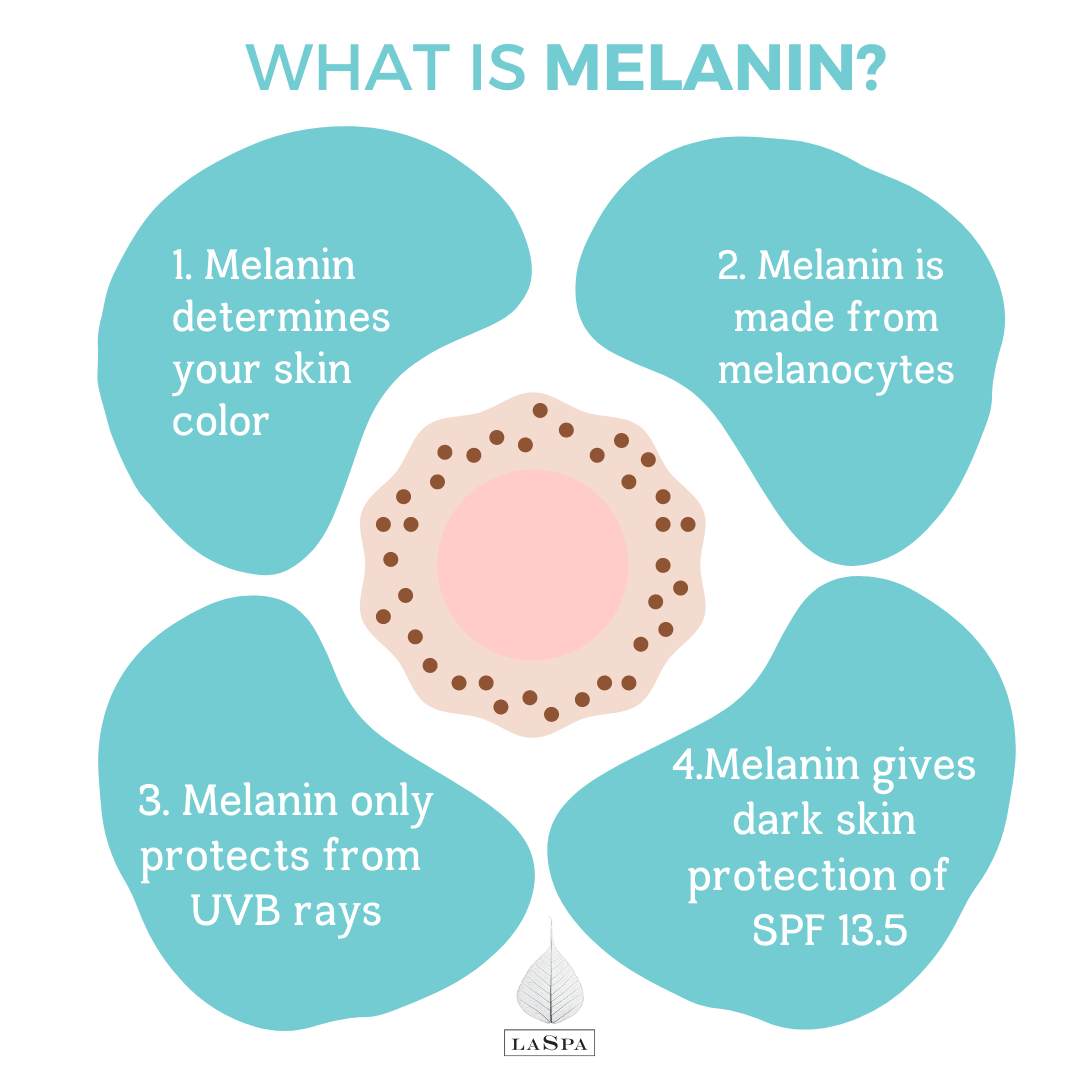Melanin Rich Skin & SPF
Only in recent times is attention being paid to doing research into skincare for the melanin rich skin. It is widely believed that the darker the skin, the less is the need for protection from the sun.


What Determines Your Skin Colour?
Melanin is the pigment that determines your skin color. The more melanin your skin produces, the darker the skin color. This pigment is created by melanocytes in the skin. Melanocytes are the cells that make melanin.
Melanin provides natural protection from UV rays to some extent. The more melanin the more the percentage of protection. Research says that melanin gives roughly 13.5 SPF to darker skin and only 4-5 SPF to fair skin.
Another point to note is that melanin only protects from UVB rays and not from UVA rays. UVA rays cause aging and wrinkles and UVB rays can damage the DNA in skin cells directly and are the main cause of sunburns. They are also thought to cause most skin cancers.
Many skin conditions are ailing people who have a dark skin tone like Melasma, Acral Lentiginous Melanoma(ALM), sun spots, wrinkles, fine lines, and brown spots are caused by the UV rays of the sun.


Melasma
Melasma is a common skin condition that presents as brown-gray patches of skin commonly found on and around the cheeks, lips, chin, nose, and forehead.
Melasma develops when skin cells become overactive and produce too much pigment in certain areas of the body. This can result due to prolonged exposure to the sun, changes in hormones, such as during pregnancy or while taking birth control pills.
Vitamin D Deficiency In Melanin Rich Skin - The Myth Debunked
Another common concern related to sunscreen use is how it affects the body’s absorption of vitamin D. The dark-skinned population suffers from twice as much Vitamin D deficiency as the white population, and many people believe sunscreen exacerbates this.
When it comes to vitamin D, even when you are wearing sunscreen, you are still getting an adequate amount of sunlight to aid with vitamin D conversion. Sunscreen still lets in the good stuff — like vitamin D from the sun — it just blocks the dangerous UV radiation.
The reason why dark-skinned people have significantly less Vitamin D is that they have more melanin which reduces their ability to synthesize Vitamin D from the sun according to The National Institute of Health’s Office of Dietary Supplements (ODS).
Skin Damage
While many dark skin people do not apply sunscreen due to misinformation about Vitamin D and natural melanin protection, the fact remains that dark skin tones can suffer the same skin damage as lighter ones.
“The damage from the sun’s harmful UVA and UVB rays to skin remains the same for all skin types.”
Sunburn in childhood doubles the risk of skin cancer. In darker skin, the damage is just not as visible or severe. But it can have a lasting effect.
Sunscreen and skin cancer are correlated. If sunscreen is not applied regularly it leads to skin diseases of which skin cancer is the most deadly. Skin cancer in dark people is detected late because the early symptoms are not detected which leads to lower survival rates. According to the Skin Cancer Foundation, the 5-year melanoma survival rate for colored people in the United States is 65%, compared with 91% for white people.
When skin cancer does occur, the most common places a tumor may develop include areas of lighter skin, such as:
- mucous membranes, such as inside the mouth
- under the nails
- the soles of the feet
- the palms of the hands
- the anogenital region, which is the area around the groin and anus
- the lower legs
In darker-skinned people, the most commonplace for a tumor to develop is on the plantar or the tissue that runs along the bottom of the foot. This accounts for 30–40% of all skin cancer cases among colored people.
The reason why this is dangerous is that skin cancer is difficult to diagnose because the symptoms tend to be harder to recognize.
Advantages Of Using Sunscreen
Dermatologists recommend that everyone should put on a sunscreen of SPF 30 at least. It should be SPF 50 if you are going to be exposed to the sun for long periods. Since the natural SPF13 is way less than what is recommended it is obvious that dark-skinned people need sunscreen as much as fair-skinned people.
All mineral sunscreens protect from both UVA and UVB rays. It protects all skin colors in the same way. Mineral sunscreens form a barrier on the skin and are made from Zinc Oxide or Titanium Dioxide, whereas chemical sunscreens are absorbed into the skin. The heat is absorbed and then scattered to protect from sunburn.
Wearing sunscreen daily and reapplying sunscreen every 2 hours is the best bet when it comes to getting protection from the sun. Other than that, staying home on hot days, wearing protective clothing, and sitting in the shade whenever possible.
Finding The Right Sunscreen
It can be difficult to find the correct sunscreen for dark skin. Most sunscreens are geared towards the fair-skinned. Only recently have companies begun producing chemical sunscreens for dark skin.
The difficulty with chemical sunscreens is that it is not suitable for sensitive skin because it contains chemicals like avobenzone and oxybenzone among others. It is not environmentally friendly or safe for use on kids. Currently, the FDA is investigating chemical sunscreens for their affect on long-term health.
Read more about which ingredients to avoid in sunscreens here.


While mineral sunscreens can be used on sensitive skin and are environment friendly, the primary ingredient used in them is zinc oxide and titanium dioxide which sometimes leaves a white cast that is not suitable for dark skin.
We at LASPA Naturals are excited to introduce our 2 new dark shades of tinted SPF 20 mineral sunscreen. The 2 new shades will be called Rich Brown and Dark Umber. They are expected to be available for purchase on our website in November 2021.
We are looking forward to bringing more products that are inclusive and tailored to the needs of all our customers.

